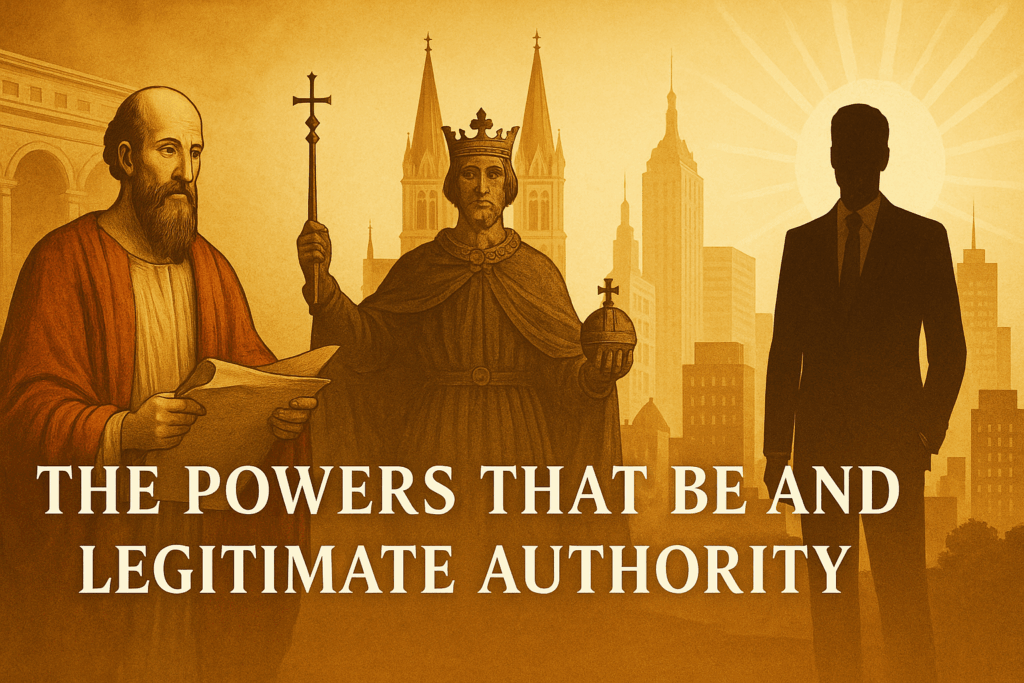In every society, the question of authority is fundamental: Who rules, and on what basis? For the ancient world, authority was often justified by sheer force, dynastic claim, or divine caprice. Paul, however, articulated a paradigm of authority rooted in accountability and stewardship. In Romans 13:1–4, he laid down principles that would shape Christian political thought for centuries and eventually undergird modern conceptions of legitimate authority, limited government, and the responsibility of rulers to serve the common good.

The Scriptural Witness
Paul begins: “Let every soul be subject unto the higher powers. For there is no power but of God: the powers that be are ordained of God” (Romans 13:1). Authority, Paul insists, is not a human invention alone but a divine institution. This claim did not sanctify tyranny, but it transformed the understanding of governance. By rooting authority in God, Paul elevated it above arbitrary self-assertion. Rulers are not gods themselves; they are accountable to God.
Paul continues in Romans 13:2: “Whosoever therefore resisteth the power, resisteth the ordinance of God: and they that resist shall receive to themselves damnation.” This affirmation was not meant to legitimize blind obedience but to highlight the seriousness of civil order. Chaos and anarchy are destructive, and order is necessary for human flourishing. Yet, because rulers are stewards, resistance becomes justified when authority ceases to serve its God-given purpose. Later Christian thinkers—from Augustine to Aquinas—would draw on this text to articulate conditions for just and unjust authority.
The Apostle then clarifies in Romans 13:3: “For rulers are not a terror to good works, but to the evil. Wilt thou then not be afraid of the power? Do that which is good, and thou shalt have praise of the same.” Authority’s legitimacy rests not on raw power but on its orientation to justice. Rulers are to be a “terror” to evil, not to the righteous. This principle, radical in its time, would later evolve into the modern conviction that governments derive legitimacy from their protection of rights and promotion of justice, not merely from conquest or tradition.
Finally, Paul writes in Romans 13:4: “For he is the minister of God to thee for good. But if thou do that which is evil, be afraid; for he beareth not the sword in vain: for he is the minister of God, a revenger to execute wrath upon him that doeth evil.” Here Paul describes rulers as servants—“ministers of God.” Authority is not for self-enrichment or domination but for the service of the people’s good. To wield power is to bear responsibility under God. This stewardship principle anticipates the modern doctrine of public service, where leaders are accountable to law, justice, and the welfare of the governed.
The Pauline Paradigm and Modern Ethics
Paul’s vision of legitimate authority broke new ground. By defining rulers as ministers of God, Paul undermined the absolutism of the ancient world. Kings and emperors could no longer claim divine status or unchecked power; they were subject to God’s higher authority. This principle fueled later Christian resistance to tyranny, providing the moral foundation for constitutional government, the rule of law, and the idea that leaders serve rather than dominate.
The emphasis on rulers as protectors of the good and punishers of evil introduced a standard by which authority could be judged. This gave rise to the notion of just governance, which influenced the Magna Carta, the Protestant resistance theories, and ultimately modern democratic thought. When the American Declaration of Independence asserts that governments derive their just powers from the consent of the governed, it echoes Paul’s conviction that rulers exist for the good of the people, not for themselves.
Equally important is Paul’s insistence on order. An ethic of freedom without order descends into chaos; an ethic of order without justice becomes tyranny. Paul’s balance—submission to authority as God’s servant, combined with the accountability of rulers to divine justice—remains the delicate tension of modern politics.
Why It Matters Today
In a world skeptical of authority, Paul’s paradigm provides both a warning and a guide. The warning is that anarchy destroys communities; the guide is that legitimate authority is never arbitrary but must serve justice and the common good. Modern secular ethics—ideas of limited government, rule of law, and the moral accountability of rulers—rest on this Pauline foundation.
To forget this heritage is to risk reducing politics either to cynical power struggles or to authoritarian control. Paul reminds us that authority is a stewardship, a trust given for the good of the governed. When rulers serve as ministers of justice, they embody the true purpose of power. When they do not, they forfeit legitimacy. This vision, first articulated by the Apostle Paul, remains the bedrock of modern civilization’s struggle to reconcile freedom, order, and justice.
Memorize The Scriptures And Doctrines From This Pauline Paradigm Here
